10 Best Intellectual Science Fiction Novels
You'd think that I'd know better than to do this again, but this isn't going to appear for a while, so I guess I don't have to deal with the backlash yet. Anyway, I was looking at my stats, and the original "intellectual science fiction movies" list appears to be the only thing that anyone cares about anyway, so I thought I'd do another one.
So here's another list, this time about books instead of movies. Of course, the title is a little misleading. There are a lot more than 10 books listed because instead of individual novels I thought it would be easier to list entire multi-volume series than listing one single novel from a masterful set. Also, I haven't read every single science fiction novel there is, so I can't claim that this is positively and universally correct, but from my current perspective it is.
So what do I mean by intellectual? The same thing I meant last time: when the stories explore issues in an interesting, realistic, and question provoking way I would consider them to be intellectual science fiction. And if they're well written, that's a plus as well. And if you don't see your favorite series of all time, you can always check at the end to see if I forgot it/haven't read it, or just didn't think it fit on this list.
Again, this isn’t based on gross receipts or popularity. The opinions are my own which obviously carries its own inherent bias. Just as a warning, I am biased toward more recent novels rather than older ones. Finally, notice that I said that these are the 10 best intellectual science fiction novels, not the 10 most intellectual science fiction novels.
Here's the list:
No. 1: The Hyperion Cantos by Dan Simmons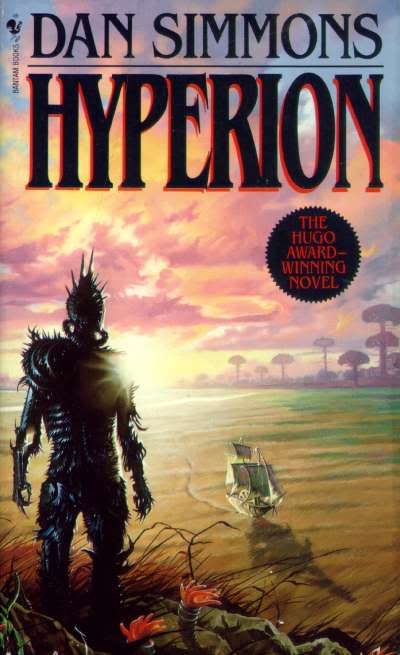
Comprising Hyperion, The Fall of Hyperion, Endymion, and The Rise of Endymion this set of epic science fiction set the bar at a height where no other author has since managed to reach, although Vernor Vinge has come very close.
Each duo sharing a common name contains one complete story, with Hyperion set years before Endymion chronologically. They're separate stories dealing with different themes and events, but only through reading both duos is the story completely revealed. I'll admit that I cried at the end of The Rise of Endymion because it was so amazingly hopeful and touching, and that's why these books are at the head of this list. The Hyperion books focus on the travels of seven strangers known as the Hyperion pilgrims on the strange planet of Hyperion toward the mysterious Time Tombs. They each have their own story and their own reason for making the dangerous voyage, and they have their own secrets as well. The Endymion books trace the voyages of some of the descendants of the Hyperion pilgrims as they battle against an interstellar theocracy known as the Pax.
True, I wasn't too impressed with Simmons' complete dismissal of me when I went looking for science fiction and fantasy writers to interview, and his two subsequent science fiction novels (Ilium and Olympos) weren't nearly as impressive (in fact, I found parts of them downright confusing). However, this set of books proves that Simmons is a master of this field, despite any personal feelings I harbor toward him.
No. 2: Most novels by Vernor Vinge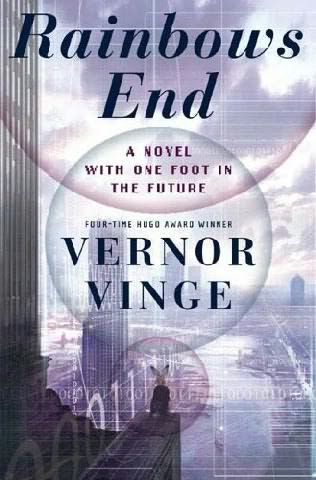
Vinge is terrifyingly good, but at least he can't pump out two or three of these novels a year to put everyone else on the market to shame. We wouldn't want him to scare off other writers from the genre. My first exposure to Vinge was the Across Realtime duo, and since then I've read Rainbows End, Tatja Grimm's World, A Deepness in the Sky, and A Fire Upon the Deep. Each one is a jewel, and Rainbows End, A Deepness in the Sky and A Fire Upon the Deep have all won Hugo awards, plus two others for novellas. When your books have won almost as many awards as there are books, you know that you're doing something right. The only book by Vinge that I wasn't shockingly impressed by was Tatja Grimm's World, which I found grim and sort of boring, but I can't deny that it was well written.
Since Rainbows End is the most recent novel by Vinge, I'll concentrate on it. It follows a family in the near future as the world changes around them. The grandfather is brought back from beyond the event horizon of Alzheimer's Disease, his son and her wife deal with their government jobs involving national security and their daughter grows up more in computers than out of them. Around them, very serious political and social events are taking place and eventually the entire family is caught in the middle.
It is a brilliant and elegant work, and some facets (such as its depiction of the loss of genius) are sublime.
No. 3: The Left Hand of Darkness by Ursula K. Le Guin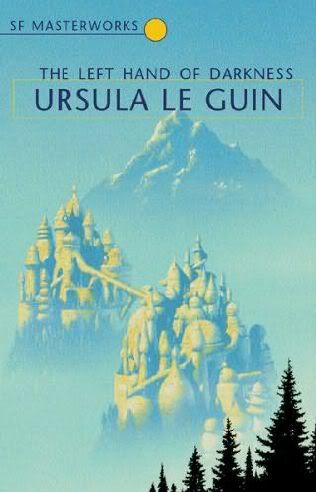
If you like hard science fiction and you haven't read this, you must stop here and go read it. This is what a masterwork of the genre looks like. Winner of both the Hugo and the Nebula awards for best novel, this book got me sucked back into a Le Guin obsession for weeks after I read it. I've already mentioned one of her short stories, "The Ones Who Walk Away from Omelas," in this blog, but this is another treasure.
Told from the perspective of a human emissary to the world of Winter, The Left Hand of Darkness is a powerful work about humanity would look like with just one little difference between us and them. Mr. Ai has traveled to a disturbing new world due to both its alien qualities and its haunting familiar resonance with the world in which we live.
A few paragraphs doesn't do this book justice, and there are other amazing works of science fiction by her out there such as The Lathe of Heaven and The Dispossessed but they'll have to suffice as we move on to . . .
No. 4: Many books by Robert A. Heinlein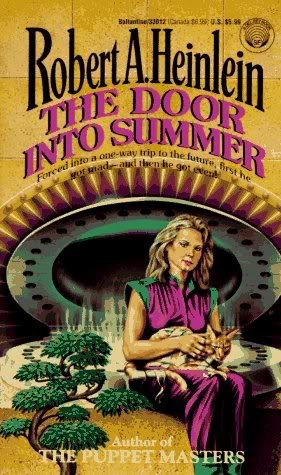
That's vague enough, isn't it? I certainly hope so. Heinlein is another author with a lot of great books, but unlike Vinge I don't think that he's almost always good, nor does he have one masterful opus that knocked me for a loop like Simmons.
Some of the books that I thought were truly amazing and thought provoking were Friday, The Puppet Masters, and especially the time travel epic The Door into Summer. I've also read Stranger in a Strange Land, and while it introduces us to the important concept of groking things, I didn't like it. I've been told that you have to be in a specific state of mind to read it and like it. Well, I must have been in the wrong state of mind, because I thought it was poor enough to put me off anything else by Heinlein for a long time.
While not really science fiction, I have also recently Job: A Comedy of Justice. I found it interesting, intelligent, witty, and brilliant. I'll guess I will have to pick up the rest of his works after all. I just picked up Have Spacesuit--Will Travel, and I put it on my reading list.
No. 5: The Foundation Trilogy (Foundation, Foundation and Empire, Second Foundation) by Issac Asimov
Possibly the second most famous science fiction series after Dune, this series examines the decay and collapse of a galactic empire. Hari Seldon, a "psychohistorian" capable of mathematically mapping social systems in the future, realizes that the galaxy spanning empire will soon collapse. In order to prevent thousands and thousands of years of war and turmoil he establishes the Foundation, a library and colony of scholars that are intended to dramatically reduce the time between the collapse of the gallactic empire and the establishment of a new and stronger empire.
The second book continues in this examination until a single unexpected variable leads to unexpected results and Seldon's plan seems to fall apart. In the third book, Seldon reveals that he may not be able to be counted out yet.
While the recent bastardized movie I, Robot was based on Asimov's work, don't think that it had anything more than a passing veneer of his ideas on it. He's produced some of the greatest works of science fiction, including the breathtakingly wonderful The Gods Themselves.
Aside from the Foundation trilogy, there are seven other novels that contain the "Foundation" moniker, including three by other authors. Additionally, the same universe contains the entire "Robot" series of stories and books as well. Although I've skipped around in his other novels, I'm not as familiar with them as I am with these first three (I specifically went back and read them specifically for this post). These books were voted the best science fiction series of all time during the 1966 Hugo Awards.
No. 6: The Galactic Milieu trilogy (Jack the Bodiless, Diamond Mask, Magnificat) by Julian May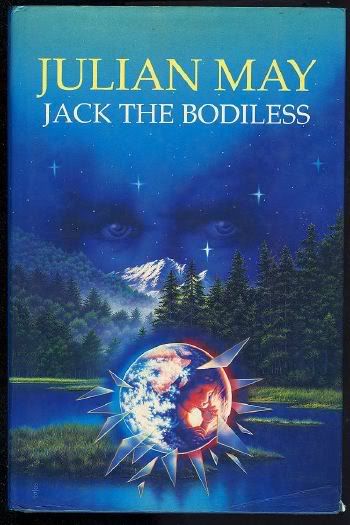
Set in May's larger alternate and future universe, these specific books revolve around the birth and coming of age of Saint Jack the Bodiless and Illuso Diamond Mask. They are two incredibly powerful "metapsychics" who eventually grow up to fight a war against a rebellion spearheaded by Jack's older brother Marc from the perspective of their Great-Uncle Rogatien Remilliard in his externally compelled autobiography. This autobiography makes of the framework of Jack the Bodiless, Diamond Mask, and Magnificat, as well as some of the other books in the same universe.
Aside from the odd dynamic of the completely psychic family, these books contain the absolute best depiction of psychic powers (or metapsychic powers as they are known in the books) that I've seen, especially since many of the characters are very, very powerful. This is partly but not entirely attributable to the fact that May has one of the largest vocabularies of any author in the last sixty years, possibly due to her years writing articles for the World Book encyclopedias. I think of myself as more than passingly conversant with the English language, but some of her books require so much deep contemplation and thought that they've been known to give my headaches and force me to resort to my unabridged dictionary for assistance.
Still, these books are incredibly well written and thought provoking and I highly recommend them to the people that are able to handle them.
No. 7: Kirinyaga by Mike Resnick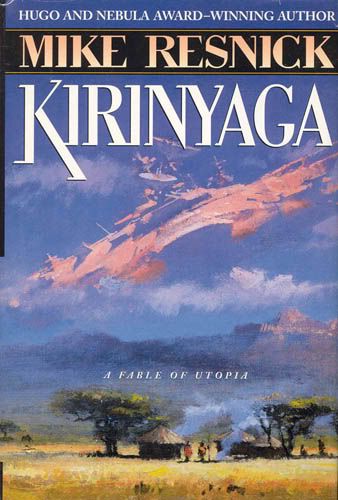
Kirinyaga is a volume of short stories tied together into a novel revolving around the character of Koriba and taking place on the planet of Kirinyaga. This book is based around the short story of "Kirinyaga" which won a Hugo award. Overall, the contents of the novel has won 67 awards and nominations including 2 Hugo Award wins, 2 HOMer Awards wins, and a Golden Pagoda award.
Even though the main character was educated at Oxford, the book's heavily non-Western themes and perspectives were eye opening when I first read it, especially Koriba's denial and rejection of everything that Western culture could offer him and his people.
"Kirinyaga" isn't actually my favorite short story in the volume. That would have to be the story "For I Have Touched The Sky" instead, which deals with themes of sexism and intelligence in tribal cultures, and easily proves why feminism in our own is so important. Each story examines one or more facets of interaction between members of the aboriginal tribal culture and/or members of the Western space monopoly that literally controls their planet.
This is an incredibly different view of dystopia/utopia, far beyond the simplistic Western dominated ideas in the movie Bladerunner or even Neuromancer and Snow Crash.
No. 8: Contact by Carl Sagan
Another masterful work by a master writer, Contact explores humanities first contact with aliens after building a giant machine found in instructions based on radio signals from outer space. Although you probably know most of the plot from the movie, there are some differences in the book including an ending that includes a significant subplot that extends for years after the end of the movie and adds a significant departure from the movie. If you don't mind major spoilers, check out the Wikipedia page for the novel, but I'm not going to reveal it here. Go read the novel for yourself.
Contact is my favorite science-fiction movie, but this is one of my favorite books as well. Sagan knows his science and he was smart enough to make his world, technology, politics and plot realistic as well.
This presence of this book pushed Arthur C. Clarke's Rendezvous with Rama series off of the list. Both are excellent works, but in my mind these two works cover similar ground in the science fiction universe, and Contact was the stronger work by far.
No. 9: Stand on Zanzibar by John Brunner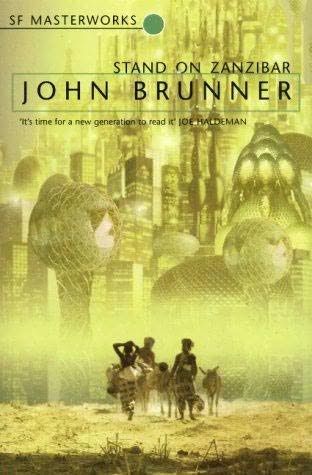
Taking place only a few years in the future, in 2010, Stand on Zanzibar is a brilliant work of fiction, not only a spectacular novel of science fiction. Brunner incorporates a brilliant storyline and narrative into a modern writing style; dividing the plot, context, characterization and setting into separate segments without compromising the novel as a whole.
The two main characters of Stand on Zanzibar are Norman House and Donald Hogan. House is a Muslim Vice President of a major corporation and Hogan is an unactivated sleeper agent. They begin as roommates, but eventually end up in drastically different places dealing with different events. I would like to point out that House is probably one of the most brilliant characters that I've read about in years.
The plot of the book revolves around overpopulation, eugenics, genetic determinism, and economics, all set in an increasingly unlikely but realistic seeming world. The one thing that knocked me for a loop is Brunner's suggestion that 7 billion people will result in a crushing mass of humanity. We have that many people now, but we aren't so compacted yet as the book suggests that we will be.
Also, there are a lot of examples of fictional technology in this book, but unlike Star Wars where everything feels magical, Brunner manages to make everything from the Moonbase to Shalmaneser the super computer seem fully integrated and normal to the world that he creates. There is no magic in Stand on Zanzibar, just the same technological basis that forms our current society with only a few minor design differences and a few years of accelerated advancement.
No. 10: Snow Crash by Neal Stephenson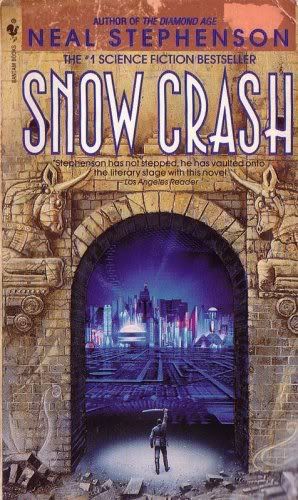
The book that kicked off cyberpunk was really William Gibson's Neuromancer, but I think the better novel is this one. Stephenson has stepped only a few years ahead and managed to make the completely dystopian landscape seem utterly and completely like the future of America. The setting of this book is almost creepily familiar, which I think is significantly more difficult than making a far future novel seem realistic.
Hiro Protagonist, the uh, well, hero and protagonist of the story is faced with a deadly virus that attacks both computers and the minds of hackers. While trying to stop the virus he travels through the virtual online Street and the real world corporate domains dealing with the mob and megachurches and deadly Inuit warriors. Assistance is provided by the awesome Y.T., a futuristic skateboard messenger that is very good at her job.
Aside from the action, which is truly spectacular, this book also contains some very interesting ideas about the biological basis for language and the way that humans are forced to relate to each other by information, the increasing control that corporations have over our lives, and why complete libertarianism is a slippery slope for governments. Oh, and it basically predicted Google Earth and Second Life.
Runner up: The Ender's Game and Ender's Shadow series by Orson Scott Card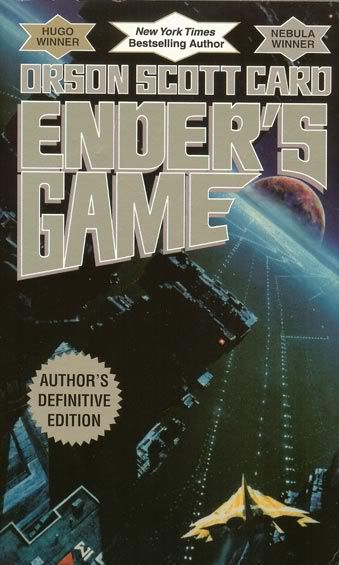
Yeah, I don't agree with Card's politics or religious beliefs but he's created two of the most well known and best loved characters and series with Ender and Bean, the respective main characters of Ender's Game and Ender's Shadow. Both are children manipulated (and in Bean's case, manipulating) the psuedo-unified Earth government as they fight a war against alien invaders not-so-affectionately called the Buggers.
Both of the first novels of the eponymous series deal with their main character's experiences in Battle School, a floating space station orbiting the Earth where kids are given military training for their eventual roles as the leaders of Earth's retaliation against the Bugger home world. The series focusing on Ender (Ender's Game, Speaker for the Dead, Xenocide, and Children of the Mind) eventually leaves earth and happens about three thousand years into the future as one planet deals with a mindbogglingly dangerous virus that threatens human civilization. It also explores the social impact of fear of the unknown, the difference between humanity and alien intelligence, and the important role that minor political changes can have in major governmental policies.
The series focusing on Bean (Ender's Shadow, Shadow of the Hegemon, Shadow Puppets, and Shadow of the Giant) focuses on the political effects and fallout following the war with the Buggers on Earth in the years following the first book, especially as it relates to the hyperintelligent children that were taken to the Battle School, and Ender's brother and sister. The first book in this series I found even more brilliant than Ender's Game, but the sequels left something to be desired.
There are rumors (and there have been rumors for several years) about a movie based on the books in the works, which I am excitedly looking forward to.
Now, if this is anything like last time, the comments will be mostly made up of people complaining that their favorite novels aren't on this list. Just like last time, I will probably add most of the unfamiliar suggestions to my reading list just as I added most of the movies suggested to my Netflix queue. However, it's not like this is everything on my shelves. Here are some of books that I've read and considered but ultimately decided didn't belong on this list:
These books are the runner ups, that would have made the list if I would have continued it a bit more. They're in no particular order.
Several books, notably Cat's Cradle, by Kurt Vonnegut
Several books by Charles Stross (Accelerando is on my "to read" list at the moment, incidentally)
Gateway by Fredrik Pohl
The Uplift Saga by David Brin
The Ringworld Trilogy by Larry Niven
Otherland by Tad Williams
Rendevous with Rama by Arthur C. Clarke
The Forever War and The Forever Peace by Joe Haldeman
Nineteen Eighty-Four by George Orwell
Neuromancer and other works by William Gibson
The following selected works were also considered and rejected for various reasons, usually that they didn't meet my standards of "intellectual." This doesn't mean that I didn't like them, it just means that I didn't think that they were appropriate for this list for one reason or another.
The Dune series by Frank Herbert
The Hitchhiker's Guide to the Galaxy by Douglas Adams
This Alien Shore by C.S. Friedman
Hammered by Elizabeth Bear
Old Man's War and sequels by John Scalzi
Do Android's Dream of Electronic Sheep? by Philip K. Dick
Several works (including Darwin's Radio) by Greg Bear
Many works by Michael Crichton
Revelation Space by Allister Reynolds
Angelmass by Timothy Zahn
Many works by Anne McCaffrey
Etc.
Of course, most people complaining that their favorite books are on the list probably aren't going to bother to read this far, and I'm sure at least one or two people will suggest movies instead of novels. Yes, there is a reason that Star Wars isn't on this list. If you have a suggestion for other books, I'd be happy to hear them though.
So here's another list, this time about books instead of movies. Of course, the title is a little misleading. There are a lot more than 10 books listed because instead of individual novels I thought it would be easier to list entire multi-volume series than listing one single novel from a masterful set. Also, I haven't read every single science fiction novel there is, so I can't claim that this is positively and universally correct, but from my current perspective it is.
So what do I mean by intellectual? The same thing I meant last time: when the stories explore issues in an interesting, realistic, and question provoking way I would consider them to be intellectual science fiction. And if they're well written, that's a plus as well. And if you don't see your favorite series of all time, you can always check at the end to see if I forgot it/haven't read it, or just didn't think it fit on this list.
Again, this isn’t based on gross receipts or popularity. The opinions are my own which obviously carries its own inherent bias. Just as a warning, I am biased toward more recent novels rather than older ones. Finally, notice that I said that these are the 10 best intellectual science fiction novels, not the 10 most intellectual science fiction novels.
Here's the list:
No. 1: The Hyperion Cantos by Dan Simmons

Comprising Hyperion, The Fall of Hyperion, Endymion, and The Rise of Endymion this set of epic science fiction set the bar at a height where no other author has since managed to reach, although Vernor Vinge has come very close.
Each duo sharing a common name contains one complete story, with Hyperion set years before Endymion chronologically. They're separate stories dealing with different themes and events, but only through reading both duos is the story completely revealed. I'll admit that I cried at the end of The Rise of Endymion because it was so amazingly hopeful and touching, and that's why these books are at the head of this list. The Hyperion books focus on the travels of seven strangers known as the Hyperion pilgrims on the strange planet of Hyperion toward the mysterious Time Tombs. They each have their own story and their own reason for making the dangerous voyage, and they have their own secrets as well. The Endymion books trace the voyages of some of the descendants of the Hyperion pilgrims as they battle against an interstellar theocracy known as the Pax.
True, I wasn't too impressed with Simmons' complete dismissal of me when I went looking for science fiction and fantasy writers to interview, and his two subsequent science fiction novels (Ilium and Olympos) weren't nearly as impressive (in fact, I found parts of them downright confusing). However, this set of books proves that Simmons is a master of this field, despite any personal feelings I harbor toward him.
No. 2: Most novels by Vernor Vinge

Vinge is terrifyingly good, but at least he can't pump out two or three of these novels a year to put everyone else on the market to shame. We wouldn't want him to scare off other writers from the genre. My first exposure to Vinge was the Across Realtime duo, and since then I've read Rainbows End, Tatja Grimm's World, A Deepness in the Sky, and A Fire Upon the Deep. Each one is a jewel, and Rainbows End, A Deepness in the Sky and A Fire Upon the Deep have all won Hugo awards, plus two others for novellas. When your books have won almost as many awards as there are books, you know that you're doing something right. The only book by Vinge that I wasn't shockingly impressed by was Tatja Grimm's World, which I found grim and sort of boring, but I can't deny that it was well written.
Since Rainbows End is the most recent novel by Vinge, I'll concentrate on it. It follows a family in the near future as the world changes around them. The grandfather is brought back from beyond the event horizon of Alzheimer's Disease, his son and her wife deal with their government jobs involving national security and their daughter grows up more in computers than out of them. Around them, very serious political and social events are taking place and eventually the entire family is caught in the middle.
It is a brilliant and elegant work, and some facets (such as its depiction of the loss of genius) are sublime.
No. 3: The Left Hand of Darkness by Ursula K. Le Guin

If you like hard science fiction and you haven't read this, you must stop here and go read it. This is what a masterwork of the genre looks like. Winner of both the Hugo and the Nebula awards for best novel, this book got me sucked back into a Le Guin obsession for weeks after I read it. I've already mentioned one of her short stories, "The Ones Who Walk Away from Omelas," in this blog, but this is another treasure.
Told from the perspective of a human emissary to the world of Winter, The Left Hand of Darkness is a powerful work about humanity would look like with just one little difference between us and them. Mr. Ai has traveled to a disturbing new world due to both its alien qualities and its haunting familiar resonance with the world in which we live.
A few paragraphs doesn't do this book justice, and there are other amazing works of science fiction by her out there such as The Lathe of Heaven and The Dispossessed but they'll have to suffice as we move on to . . .
No. 4: Many books by Robert A. Heinlein

That's vague enough, isn't it? I certainly hope so. Heinlein is another author with a lot of great books, but unlike Vinge I don't think that he's almost always good, nor does he have one masterful opus that knocked me for a loop like Simmons.
Some of the books that I thought were truly amazing and thought provoking were Friday, The Puppet Masters, and especially the time travel epic The Door into Summer. I've also read Stranger in a Strange Land, and while it introduces us to the important concept of groking things, I didn't like it. I've been told that you have to be in a specific state of mind to read it and like it. Well, I must have been in the wrong state of mind, because I thought it was poor enough to put me off anything else by Heinlein for a long time.
While not really science fiction, I have also recently Job: A Comedy of Justice. I found it interesting, intelligent, witty, and brilliant. I'll guess I will have to pick up the rest of his works after all. I just picked up Have Spacesuit--Will Travel, and I put it on my reading list.
No. 5: The Foundation Trilogy (Foundation, Foundation and Empire, Second Foundation) by Issac Asimov

Possibly the second most famous science fiction series after Dune, this series examines the decay and collapse of a galactic empire. Hari Seldon, a "psychohistorian" capable of mathematically mapping social systems in the future, realizes that the galaxy spanning empire will soon collapse. In order to prevent thousands and thousands of years of war and turmoil he establishes the Foundation, a library and colony of scholars that are intended to dramatically reduce the time between the collapse of the gallactic empire and the establishment of a new and stronger empire.
The second book continues in this examination until a single unexpected variable leads to unexpected results and Seldon's plan seems to fall apart. In the third book, Seldon reveals that he may not be able to be counted out yet.
While the recent bastardized movie I, Robot was based on Asimov's work, don't think that it had anything more than a passing veneer of his ideas on it. He's produced some of the greatest works of science fiction, including the breathtakingly wonderful The Gods Themselves.
Aside from the Foundation trilogy, there are seven other novels that contain the "Foundation" moniker, including three by other authors. Additionally, the same universe contains the entire "Robot" series of stories and books as well. Although I've skipped around in his other novels, I'm not as familiar with them as I am with these first three (I specifically went back and read them specifically for this post). These books were voted the best science fiction series of all time during the 1966 Hugo Awards.
No. 6: The Galactic Milieu trilogy (Jack the Bodiless, Diamond Mask, Magnificat) by Julian May

Set in May's larger alternate and future universe, these specific books revolve around the birth and coming of age of Saint Jack the Bodiless and Illuso Diamond Mask. They are two incredibly powerful "metapsychics" who eventually grow up to fight a war against a rebellion spearheaded by Jack's older brother Marc from the perspective of their Great-Uncle Rogatien Remilliard in his externally compelled autobiography. This autobiography makes of the framework of Jack the Bodiless, Diamond Mask, and Magnificat, as well as some of the other books in the same universe.
Aside from the odd dynamic of the completely psychic family, these books contain the absolute best depiction of psychic powers (or metapsychic powers as they are known in the books) that I've seen, especially since many of the characters are very, very powerful. This is partly but not entirely attributable to the fact that May has one of the largest vocabularies of any author in the last sixty years, possibly due to her years writing articles for the World Book encyclopedias. I think of myself as more than passingly conversant with the English language, but some of her books require so much deep contemplation and thought that they've been known to give my headaches and force me to resort to my unabridged dictionary for assistance.
Still, these books are incredibly well written and thought provoking and I highly recommend them to the people that are able to handle them.
No. 7: Kirinyaga by Mike Resnick

Kirinyaga is a volume of short stories tied together into a novel revolving around the character of Koriba and taking place on the planet of Kirinyaga. This book is based around the short story of "Kirinyaga" which won a Hugo award. Overall, the contents of the novel has won 67 awards and nominations including 2 Hugo Award wins, 2 HOMer Awards wins, and a Golden Pagoda award.
Even though the main character was educated at Oxford, the book's heavily non-Western themes and perspectives were eye opening when I first read it, especially Koriba's denial and rejection of everything that Western culture could offer him and his people.
"Kirinyaga" isn't actually my favorite short story in the volume. That would have to be the story "For I Have Touched The Sky" instead, which deals with themes of sexism and intelligence in tribal cultures, and easily proves why feminism in our own is so important. Each story examines one or more facets of interaction between members of the aboriginal tribal culture and/or members of the Western space monopoly that literally controls their planet.
This is an incredibly different view of dystopia/utopia, far beyond the simplistic Western dominated ideas in the movie Bladerunner or even Neuromancer and Snow Crash.
No. 8: Contact by Carl Sagan

Another masterful work by a master writer, Contact explores humanities first contact with aliens after building a giant machine found in instructions based on radio signals from outer space. Although you probably know most of the plot from the movie, there are some differences in the book including an ending that includes a significant subplot that extends for years after the end of the movie and adds a significant departure from the movie. If you don't mind major spoilers, check out the Wikipedia page for the novel, but I'm not going to reveal it here. Go read the novel for yourself.
Contact is my favorite science-fiction movie, but this is one of my favorite books as well. Sagan knows his science and he was smart enough to make his world, technology, politics and plot realistic as well.
This presence of this book pushed Arthur C. Clarke's Rendezvous with Rama series off of the list. Both are excellent works, but in my mind these two works cover similar ground in the science fiction universe, and Contact was the stronger work by far.
No. 9: Stand on Zanzibar by John Brunner

Taking place only a few years in the future, in 2010, Stand on Zanzibar is a brilliant work of fiction, not only a spectacular novel of science fiction. Brunner incorporates a brilliant storyline and narrative into a modern writing style; dividing the plot, context, characterization and setting into separate segments without compromising the novel as a whole.
The two main characters of Stand on Zanzibar are Norman House and Donald Hogan. House is a Muslim Vice President of a major corporation and Hogan is an unactivated sleeper agent. They begin as roommates, but eventually end up in drastically different places dealing with different events. I would like to point out that House is probably one of the most brilliant characters that I've read about in years.
The plot of the book revolves around overpopulation, eugenics, genetic determinism, and economics, all set in an increasingly unlikely but realistic seeming world. The one thing that knocked me for a loop is Brunner's suggestion that 7 billion people will result in a crushing mass of humanity. We have that many people now, but we aren't so compacted yet as the book suggests that we will be.
Also, there are a lot of examples of fictional technology in this book, but unlike Star Wars where everything feels magical, Brunner manages to make everything from the Moonbase to Shalmaneser the super computer seem fully integrated and normal to the world that he creates. There is no magic in Stand on Zanzibar, just the same technological basis that forms our current society with only a few minor design differences and a few years of accelerated advancement.
No. 10: Snow Crash by Neal Stephenson

The book that kicked off cyberpunk was really William Gibson's Neuromancer, but I think the better novel is this one. Stephenson has stepped only a few years ahead and managed to make the completely dystopian landscape seem utterly and completely like the future of America. The setting of this book is almost creepily familiar, which I think is significantly more difficult than making a far future novel seem realistic.
Hiro Protagonist, the uh, well, hero and protagonist of the story is faced with a deadly virus that attacks both computers and the minds of hackers. While trying to stop the virus he travels through the virtual online Street and the real world corporate domains dealing with the mob and megachurches and deadly Inuit warriors. Assistance is provided by the awesome Y.T., a futuristic skateboard messenger that is very good at her job.
Aside from the action, which is truly spectacular, this book also contains some very interesting ideas about the biological basis for language and the way that humans are forced to relate to each other by information, the increasing control that corporations have over our lives, and why complete libertarianism is a slippery slope for governments. Oh, and it basically predicted Google Earth and Second Life.
Runner up: The Ender's Game and Ender's Shadow series by Orson Scott Card

Yeah, I don't agree with Card's politics or religious beliefs but he's created two of the most well known and best loved characters and series with Ender and Bean, the respective main characters of Ender's Game and Ender's Shadow. Both are children manipulated (and in Bean's case, manipulating) the psuedo-unified Earth government as they fight a war against alien invaders not-so-affectionately called the Buggers.
Both of the first novels of the eponymous series deal with their main character's experiences in Battle School, a floating space station orbiting the Earth where kids are given military training for their eventual roles as the leaders of Earth's retaliation against the Bugger home world. The series focusing on Ender (Ender's Game, Speaker for the Dead, Xenocide, and Children of the Mind) eventually leaves earth and happens about three thousand years into the future as one planet deals with a mindbogglingly dangerous virus that threatens human civilization. It also explores the social impact of fear of the unknown, the difference between humanity and alien intelligence, and the important role that minor political changes can have in major governmental policies.
The series focusing on Bean (Ender's Shadow, Shadow of the Hegemon, Shadow Puppets, and Shadow of the Giant) focuses on the political effects and fallout following the war with the Buggers on Earth in the years following the first book, especially as it relates to the hyperintelligent children that were taken to the Battle School, and Ender's brother and sister. The first book in this series I found even more brilliant than Ender's Game, but the sequels left something to be desired.
There are rumors (and there have been rumors for several years) about a movie based on the books in the works, which I am excitedly looking forward to.
***
Now, if this is anything like last time, the comments will be mostly made up of people complaining that their favorite novels aren't on this list. Just like last time, I will probably add most of the unfamiliar suggestions to my reading list just as I added most of the movies suggested to my Netflix queue. However, it's not like this is everything on my shelves. Here are some of books that I've read and considered but ultimately decided didn't belong on this list:
These books are the runner ups, that would have made the list if I would have continued it a bit more. They're in no particular order.
Several books, notably Cat's Cradle, by Kurt Vonnegut
Several books by Charles Stross (Accelerando is on my "to read" list at the moment, incidentally)
Gateway by Fredrik Pohl
The Uplift Saga by David Brin
The Ringworld Trilogy by Larry Niven
Otherland by Tad Williams
Rendevous with Rama by Arthur C. Clarke
The Forever War and The Forever Peace by Joe Haldeman
Nineteen Eighty-Four by George Orwell
Neuromancer and other works by William Gibson
The following selected works were also considered and rejected for various reasons, usually that they didn't meet my standards of "intellectual." This doesn't mean that I didn't like them, it just means that I didn't think that they were appropriate for this list for one reason or another.
The Dune series by Frank Herbert
The Hitchhiker's Guide to the Galaxy by Douglas Adams
This Alien Shore by C.S. Friedman
Hammered by Elizabeth Bear
Old Man's War and sequels by John Scalzi
Do Android's Dream of Electronic Sheep? by Philip K. Dick
Several works (including Darwin's Radio) by Greg Bear
Many works by Michael Crichton
Revelation Space by Allister Reynolds
Angelmass by Timothy Zahn
Many works by Anne McCaffrey
Etc.
Of course, most people complaining that their favorite books are on the list probably aren't going to bother to read this far, and I'm sure at least one or two people will suggest movies instead of novels. Yes, there is a reason that Star Wars isn't on this list. If you have a suggestion for other books, I'd be happy to hear them though.
Labels: backdated, books, media, science fiction



11 Comments:
Dude I could not get into Snowcrash, and that is saying a LOT since I love stories about the Dark Future and especially people with goggles. :[
By ashley, at 12:20 PM
ashley, at 12:20 PM
Presence on this list does not indicate that they're easy to read. I still have three Julian May books lying around that I've found completely incomprehensible.
It took me a while to get in the way Stephenson uses language, but I read The Diamond Age years ago, which I think helped me out a bit.
By Spherical Time, at 12:22 PM
Spherical Time, at 12:22 PM
I'm just not a sci-fi kid. I really wish I was because I actually love science fiction...I just need more balance. Less stark action and more humanity!
By ashley, at 12:34 PM
ashley, at 12:34 PM
I would suggest the inclusion of Daniel Keyes' novel _Flowers For Algernon_ in this list. Its omission would suggest that you haven't read it -- a mistake I would urge you to correct as soon as you can. If you have read it and disagree, I would dearly love to know your reason?
I'm glad someone else recognises the genius of May's representation of psionics in her Galactic Milieu novels. The only thing I've seen come close has been Alfred Bester in 'The Demolished Man'.
By Anonymous, at 12:08 PM
Anonymous, at 12:08 PM
I've never read it, but it has been recommended to me several times so I know that I should be getting to it eventually. If I see a copy I'll pick it up. Thanks though, jitsuker.
By Spherical Time, at 9:21 PM
Spherical Time, at 9:21 PM
I am of german native tongue and watched nearly all episodes of "Alpha Centauri" by Mr. Harald Lesch.
What he says lets one realize why already nowadays, most people consider sci fi dead which is true. Well, newer novels get written, knowing about the tech of our time.
Still. I am NOT intrested in what happens only some ridiculous 3000 years from now. I wanna read a really authentic novel, displaying the evolution of whole galaxies and super galaxy groups. Its always the same. While on one hand, many things are SURELY happening somewhere when here, we don't believe it, on the other hand, when you start some of the many novels (funnily more the newer ones!), you instantly disbelieve the whole setting.
For example also: This whole centeredness around us humans. Or other space creatures. I'm sure somewhere are such big areas of space populated with much larger communities of beings. But also, a good sci fi "story", more a galactic epos, should let us take the camera viewpoint of entire epochs of time, I'm talkin' some billions of years here, in order to make us see the real big evolutions and therefore a much deeper sense of existence.
I don't ask too much. Any writer of sci fi should NOW start to learn german, watch Lesch, and then write a scientifically authentic description of really big areas of time.
By Anonymous, at 11:29 PM
Anonymous, at 11:29 PM
... I got to add that evry authenticity combines physical laws with the utmost fantastic truths of REALLY far away.
Always, when a writer is looking for a good plot, he commits the fundamental mistake of trying to write something "good". IT HAS to come out very badly, in EVRY single case, if that is his only motivation which is poor.
What is REALLY happenin' out there where the truth is (oops Moulder again, in a different sense now), defies all earthly sci fi. When will I find one single novel where I can say: "That could REALLY be"? I am musician and only read few books like Nietzsche. I read some sci fi once, long ago. for now some years, also listening to Iron Maiden and also playing their "Ghost of the navigator", I got intrested in both the movie (always worse) and the novel.
But this small time frame of almost all sci fi stories is a major problem. also the lack of mostly all or really all authors of proper science. when you watch Lesch, you can fantasize all you want and still be in the range of the REALLY, REALLY easily possible, even probable. THEN you start believing which I want to (outfading X Files melody by Marc Snow .-)
By Anonymous, at 11:41 PM
Anonymous, at 11:41 PM
sorry for my three posts in a row, I don't now wanna take the time to register an account:
only shortly to specify my time indication: ... because in german and english, there is some confusion about the dimensions of time named by the words "millions" and "billions": By "billions", I don't mean only millions. I mean the number 1'000'000'000, NOT only some 1'000'000. I hope its clear.
Also, I got to add that I do in fact care what happens to mankind in some 3000 years, but regarding space, I know now after seeing Lesch in Alpha Centauri how big the universe is, he explains it in one episode. It is unimagineable. This leads me to the sad conclusion that we humans are also in literature so VERY oppressed by stupidity and needless fear and cowardice. Of course, I am afraid that fascism might spread into space one day, which we have to prevent. But we should dare to take on bigger dimensions at least in our fantasy.
For some 10 years now, I was much more into the past than into the so-called "future" which only always is the now, hobbling and limping onwards. No wonder. The past is the magical box, the cause for any future ever. Yet, most parts of mankind don't understand the past or forgot it or repeat the same mistakes, even. Which in our stupid some 10'000 years don't lead us into ANY real "future", but only into a pseudo-like, supertech, but still the SAME earthly world of being totally isolated from the rest of space by our own evilness and ignorance, and I do well appreciate the wonders we already achieved. If we don't step up ethically, we won't be accepted by any ethical space community, nor can ever hope to be wise enough to really be able to keep up our minds with our tech stuff, we are already slaves to our own tech who rules US instead the other way round. The mouse is the first step to a system where most people don't see anymore what's happening in the background of the system.
By Anonymous, at 11:58 PM
Anonymous, at 11:58 PM
In response to Josh Gainsborough:
Science fiction isn't dead. Certainly not in America anyway. There are people like Michael Chabon, Charles Stross, John Scalzi and even Vernor Vinge writing currently that are greatly expanding science fiction.
Not all of these novels happen 3000 years from now. Rainbow's End, shown above, is both brilliant and realistic and set only a few years in the future. That book could come to really be.
To the next couple of chunks of your first post I will only say that while you are interested only in those kinds of books I am interested in a lot more. Your narrow interest in epoch sagas of the lives of stars and galaxies does not limit the rest of us. Some of us are interested in cyberpunk or "hard" science fiction or science fantasy. Happily, we all like different things so that we can support many authors writing different books.
To your second post:
This small time frame is a problem for you. It isn't a problem for the rest of us. Science fiction written with a small time frame can be very good.
We like science fiction because we like what is already there. You seem to have found one auteur that you like and want the rest of the field to change to mimic him.
Also, as someone who writes science fiction and "wants it to be good" I think it's a fairly big insult to suggest that anything written in that capacity ends up poorly written.
Finally, you realize that there are scientists writing science fiction in the United States, right? One of the former presidents of the Science Fiction Writer's Association was a working astrophysicist. There are others that are rocket scientists, biologists, doctors, chemists and many others. The genre that I call "hard" science fiction deals with the more technical aspects of what science may accomplish, making predictive guesses about the future.
In response to your third post:
Uh. Okay.
I will look for a English translation of Alpha Centauri by Lesch. Perhaps there is a copy on Netflix.
By Spherical Time, at 12:49 PM
Spherical Time, at 12:49 PM
Hey, if you're into intellectual sci-fi, go check out Robert J. Sawyer's books. They're thought-provoking, incredibly polished and well-written, have engaging characters and plot lines, and incorporate extrapolations based on real science.
By Unknown, at 10:09 AM
Unknown, at 10:09 AM
You should also check out Liu Cixin's Dark Forest Trilogy and see if you'll revise your list after reading it.
By stooshi, at 10:07 AM
stooshi, at 10:07 AM
Post a Comment
<< Home